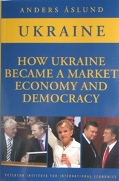How Ukraine became a Market Economy and Democracy

Anders Aslund’s “How Ukraine became a Market Economy and Democracy” is structured to analyze every regime of independent Ukraine and its respective achievements, starting with the Kravchuk’s years (1991-1994), which centered on nation-building and ignored necessary economic reforms that eventually led the country to the brink of collapse amid hyperinflation and allowed a rent-seeking society to grow. The first stage of serious economic reforms took place under Leonid Kuchma’s presidency.
Elected President in 1994, Kuchma set to realize five goals: financial stabilization, privatization, Ukrainian integrity, adoption of a new constitution and improved relations with Russia and the United States. In 1996, he had achieved all of them and had brought Ukraine financial stabilization and mass privatization. Years of stagnation, however, followed, with the oligarch society protecting its interest and thus hampering needed economic reforms to set Ukraine back on the path of growth.
This oligarch society did not disappear until 1999, when Ukraine faced external default and they themselves started pushing for reforms. Elected Prime Minister in 2000, Yushchenko stroke a powerful and rapid blow to the oligarchs, squeezing them one by one, until the rent-seeking society was brought down to its knee and what was left over participated actively in leveling up the country's national production output. He also launched a series of reforms that were successful in bringing Ukraine a positive fiscal balance and economic growth for the first time in a decade. This second important period of reforms was still economic in orientation, and not until the Orange Revolution in 2004 did democracy broke through in Ukraine.
Politically speaking, “Ukraine is [still] a democracy on approbation” notes Aslund; “it needs to steep out the gray zone between a presidential and parliamentary system and should reform its judicial system.” With current challenges like the financial crisis, recurrent gas dispute, and unclear delineation of power between the President and the Prime Minister, Ukraine’s democracy remains fragile. Recent WTO accession and a will to join the European Union might prove enough though to withstand the threats facing democracy in Ukraine in the forthcoming years.
Anders Aslund, a senior fellow of the Peterson Institute for International Economics since 2006, former economic adviser to the governments of Russia and Ukraine and to President Askar Akaev of Kyrgyzstan, is chairman of CASE’s Advisory Council. He has also worked as a Swedish diplomat in Kuwait, Poland, Geneva, and Moscow.
The book is available at:
http://bookstore.petersoninstitute.org/book-store/4273.html
